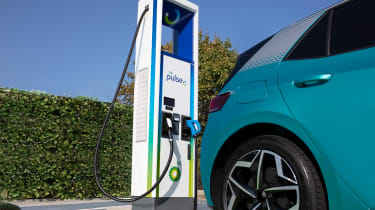Electric cars in the UK: are we ready for the EV revolution?
We take an in-depth look at how the UK is getting ready for the switch to electric
The UK car industry has weathered several storms in recent years, with Brexit uncertainty causing significant difficulties, and Covid-19 closing dealerships and factories. But with a free-trade agreement with the EU now in place for cars, and the UK’s vaccine rollout well under way, things – while some way off being ‘normal’ – are more optimistic than they have been in recent times.
The future brings more challenges, though. The Government’s confirmation in November last year that sales of new cars without significant electrification would be banned in 2030, before new internal-combustion-engined vehicles are outlawed entirely in 2035, sets a high bar for the automotive industry, not to mention car buyers.
While we have a Brexit deal that’s largely favourable to the automotive industry, strict rules-of-origin legislation means that by 2027, at least 55 per cent of an electric car must be built in the UK or EU in order for the vehicle to remain exempt from import or export tariffs. Given that batteries and motors tend to comprise a huge proportion of an EV’s value, and these components are typically made outside the UK and EU, the race is on for car makers to produce batteries and motors here and on the continent.
Such challenges present enormous opportunities, and there’s a growing sense that the UK is well positioned to hit its ambitious 2030 and 2035 targets for EV adoption, and capitalise on EU-UK trade conditions that will compel us to build our own EV tech. These targets and quotes will require sea changes both from the industry and consumers, though, so here we ask the simple question: how prepared is the UK for the EV revolution?
Small distances, big market
The UK is a small country. It only takes around two and a half hours to drive the width of England from Liverpool to Hull, or 14 and a half hours to get from Land’s End in Cornwall, to John O’Groats in Scotland.
By comparison, driving across the entire US from New York to San Francisco would involve a minimum of 43 hours on the road without stops, while crossing the breadth of Texas alone is a 12-hour endeavour.
Perhaps unsurprisingly, therefore, drivers in the UK tend to cover lower mileages than those in other countries, with the average Brit covering just 7,400 miles a year. With charge times for EVs significantly longer than filling the tank of an equivalent petrol or diesel vehicle, this means the inconvenience of topping up a car’s batteries needs to happen far less frequently here than it would in the US, for example.
The UK’s small land mass also means that it’s far less work to implement a comprehensive nationwide public charging infrastructure – a key requirement for those who regularly cover distances longer than an EV’s range – than it would be in Russia, for example. When you add in the fact that the average length of each car journey is around 8.5 miles in the UK, plus consider ‘destination chargers’ are becoming increasingly common at supermarkets, hotels, gyms and elsewhere, it’s clear that frequent top-ups, rather than big weekly charges, are likely to be the norm for many, especially those without driveways and garages. One analogy many use, for example, is that charging an EV should be approached more like topping up a smartphone battery – something that’s much easier if you have multiple chargers dotted about your house.
On top of this, we need to consider how keen us Brits tend to be on getting a fresh set of wheels. The UK market is second only to Germany’s for new cars in Europe, so our ability to get EVs on the road is significant, and ably shown by the fact that plug-in cars (EVs and PHEVs) outsold diesel models in January 2021. So while there are around 31 million cars in the UK, our fondness for buying new ones should stand us in good stead for making the eventual switch to electric faster than some nations.
Mike Hawes, chief executive of the Society of Motor Manufacturers and Traders (SMMT), believes the UK “undoubtedly” has advantages in the transition to electric vehicles in these regards. He told us: “UK consumers are often quick to embrace new technologies, we travel fewer miles on average than some other countries and we are a relatively affluent market.”
Rachel Maclean MP, under secretary of state for transport, echoed these sentiments, praising the UK’s “big market” and the fact Brits are “very keen to buy cleaner cars”.
“In 2019, we were the third-largest market in Europe for ultra-low-emission vehicles behind Norway and Germany,” Maclean added. “and that number is going up all the time.”
However small our country may be, and however keen Brits are on new cars, the uptake of EVs goes hand-in-hand with the growth of reliable, affordable and convenient chargepoints. The SMMT’s Mike Hawes said the Government’s commitment to improving rapid charging facilities was “a welcome step”, but argued that “if motorists are to be confident that recharging is as easy as refuelling, significant investment will be necessary.” He added: “In particular, EV drivers need to see a massive increase in public on-street charging, because not every driver has designated off-street parking.”
The Department for Transport (DfT) is on the same page, recently doubling to £20million its annual allocation for councils to spend on street chargers in residential areas. Some local authorities have been slow to take up the funding, though, potentially because councils have to make up 25 per cent of the cost. Whatever the reasons, research from Capita suggests local authorities plan to install an average of just 35 roadside chargers between now and 2025, with 126 local authorities not planning any.
We raised this with Rachel Maclean, who accepted it was “right” for the issue to be flagged, but pointed out that 105 councils have taken up the funding. “We know we need to do more,” she admitted, adding the Government wants to “make sure councils do take advantage of the funding”. If £20m seems small fry, there’s also a £1.3billion pot of central money to support the nationwide rollout of chargepoints.
As well as public sector investment, private enterprise clearly has a role to play in chargepoint infrastructure. BP Pulse owns and operates the UK’s largest public charging network, and its head of external affairs, Tom Callow, argued that on-street chargers are not a “silver bullet”, with the “blended solution” of home, destination and public chargers being the answer. Callow did highlight that chargepoints don’t come cheap, though, with a typical cost of £150,000, and quotes of £2-3million at certain sites.
It’s no good having plentiful chargers if they can’t be trusted to work reliably, though, something our Driver Power chargepoint survey showed isn’t always the case. Again, work is being done to resolve this, with Transport Secretary Grant Shapps having previously announced a consultation into their regulation.
Andy Palmer, who led the development of the original Nissan Leaf – the world’s first mass-market EV – told the Auto Express Podcast that chargepoints should be at the front of planners’ and architects’ minds when devising new projects.
“At every opportunity – when you’re building new car parks or buildings – you have to mandate that every parking space has a charger,” he said. “You have to mandate that any fuel station has to have chargers. Essentially, you have to make it part of the building regulations, and you have to do that 10 years in advance of having a big body of electric vehicles – which is to say that if we’re going to have mostly electric vehicles in 2030, we need to make sure in the UK that we’re getting that infrastructure right now.”
The EV-friendly nature of the UK is boosted by its status as a hub of engineering expertise, particularly in the automotive sector. This has brought it to the attention of major investors, such as Britishvolt, which plans to build the country’s first gigafactory in Northumberland.
When the final phase of construction is completed in 2027, this £2.6billion plant will be producing 300,000 lithium-ion battery packs every year, creating 3,000 jobs directly and a further 5,000 in its wider supply chain. Enterprises such as this will be vital if the UK is to meet that 55 per cent rules-of-origin clause, too.
Britishvolt’s chief strategy officer, Isobel Sheldon, pointed out that the lithium-ion battery – which is the power source in all modern EVs – was actually invented at Oxford University, and that while she considered that this hasn’t necessarily been capitalised on as
much as it might, this could soon change.
“We’ve now come to the point where some fundamental stuff has come together quite nicely for us – the UK industrial strategy has identified the battery industry as a key strategic need for the economy to grow jobs and be part of that green recovery we’re all chasing.”
Sheldon pointed out that the UK already has a strong supply chain for battery production. The second-largest nickel refinery in Europe can be found in south Wales, while Lincolnshire produces the highest-quality needle coke, a vital component of a lithium-ion battery.
“We have such good fundamentals in this country,” Sheldon continued. “We have an industry that needs to transition, we have the technology and the innovation that support advanced battery development. When people ask me why we’re investing in the UK, I say, ‘Why wouldn’t you?”
Rachel Maclean said the Government has provided “certainty” for the automotive industry in the UK by setting a clear 2030 deadline for the phasing out of new petrol and diesel car sales. “That’s already driving investment,” she said. “We always want to see more of that. We stand ready to work with industry to ensure that happens.
“There’s a massive amount of interest – we’re seeing so many innovative players coming forward and we’re also seeing lots of existing businesses shifting their focus.”
Find a car with the experts








